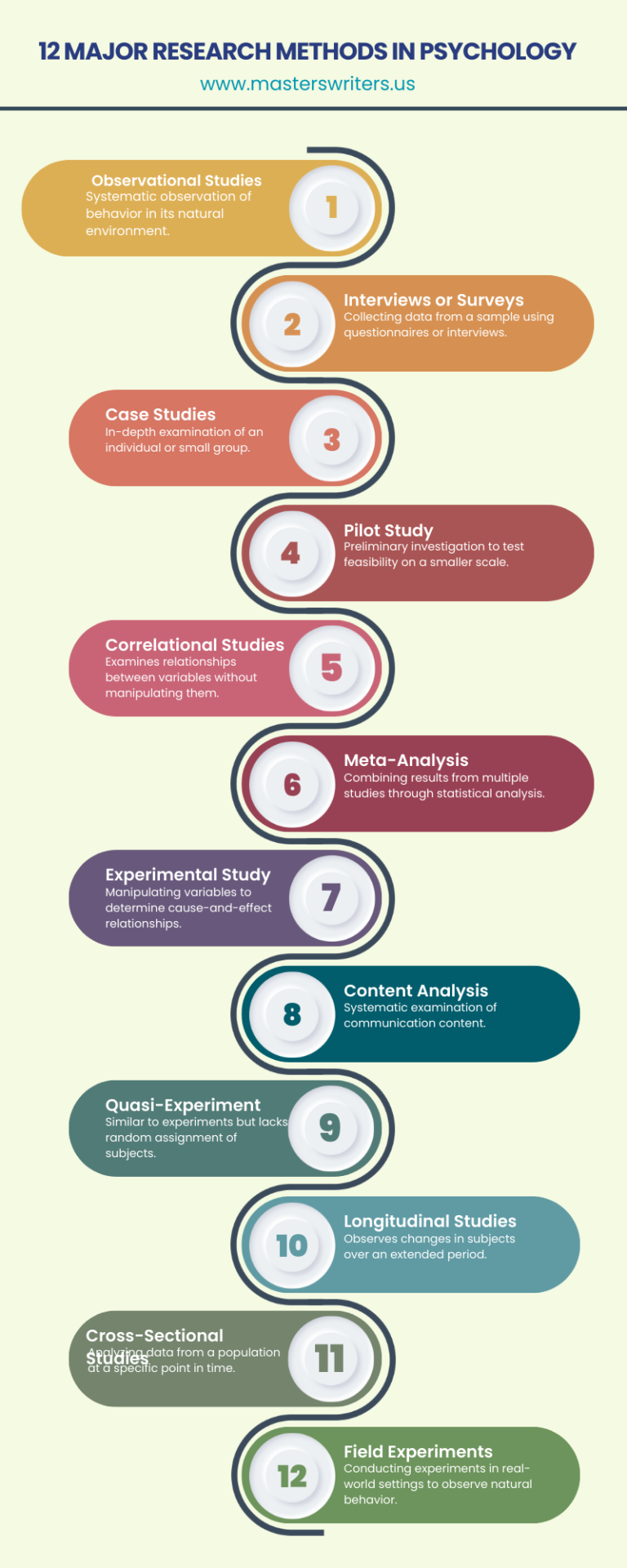Healthcare
Research Methods in Psychology: Tips, Examples, FAQs


Research methods in psychology are essential tools that enable psychologists to gather and analyze data, helping to understand human behavior and mental processes. This article delves into the various research methods in psychology, offering tips, examples, and answers to frequently asked questions. We’ll explore the differences between theory and hypothesis, the types of research methods used, and why understanding these methods is crucial. From observational studies and interviews to experimental research and meta-analyses, you’ll gain a comprehensive overview of the methodologies that shape psychological research. Whether you’re a student, researcher, or simply curious about psychology, this guide will provide valuable insights into the scientific approaches that drive this fascinating field.
Theory vs. Hypothesis in Psychology Research
In the realm of research methods in psychology, it is crucial to distinguish between a theory and a hypothesis, as these concepts play foundational roles in the scientific process. While often used interchangeably in casual conversation, their meanings and applications in psychological research are distinct and specific.
A theory is a well-substantiated explanation of some aspect of the natural world that is based on a body of evidence. Theories are developed through repeated observations and extensive testing. They integrate facts, laws, predictions, and tested hypotheses to understand a particular phenomenon comprehensively. For instance, psychology’s theory of cognitive development explains how human intelligence evolves through various stages.
On the other hand, a hypothesis is a specific, testable prediction about the outcome of a study. It is a tentative statement that proposes a possible explanation for some phenomenon or event. For example, in a study examining the link between sleep quality and cognitive performance, a hypothesis might be, “We predict that individuals who get at least 8 hours of sleep will perform better on cognitive tasks than those who get less sleep.” Unlike theories, hypotheses are narrower in scope. They are designed to be tested through experimentation or observation.
The key distinctions include:
- Scope: Theories predict events in general terms, providing a broad framework for understanding phenomena, whereas hypotheses make specific predictions about particular situations or sets of circumstances.
- Testing and Acceptance: Theories have undergone extensive testing and are widely accepted within the scientific community. Hypotheses, however, are initial guesses that require empirical testing to be validated or refuted.
Understanding these differences is essential for anyone engaging with research methods in psychology, as it underpins the design, implementation, and interpretation of scientific studies.

Research Writing Giving You Headaches?
Save yourself from unnecessary trouble, and let us take care of all your work for you!
What are Research Methods in Psychology?
Research methods in psychology are essential tools used to explore, understand, and interpret human behavior, thoughts, and emotions. These methods enable psychologists to collect data, test hypotheses, and derive conclusions about the intricate workings of the mind. The primary research methods include:

- Observational Studies: Systematically observing and recording behavior in either natural or controlled settings, which can be conducted overtly (with subjects’ awareness) or covertly (without their knowledge).
- Interviews or Surveys: Gathering data by asking individuals questions to understand their thoughts, feelings, and experiences.
- Case Studies: Detailed examinations of a single person, group, or event to uncover unique or complex phenomena.
- Experiments: Manipulating one or more variables in a controlled environment to investigate their impact on other variables, establishing cause-and-effect relationships.
- Correlational Studies: Analyzing the relationships between two or more variables to identify associations without determining causality.
In the following sections, we will delve deeper into these methods and explore additional research techniques used in psychology. If you require immediate assistance with your research tasks, reach out with “write my research paper for me,” and we’ll be ready to help.
Observational Studies
Observational studies involve systematically watching and recording the behavior of individuals or groups in their natural or controlled environments. This method allows researchers to collect data without manipulating any variables, genuinely representing behaviors as they naturally occur. Observational studies can be conducted overtly, where participants are aware they are being observed, or covertly, where participants are unaware of the observation.
Situations where observational studies are used include:
- Natural Settings: Researchers observe behavior in a natural environment without influencing participants. For example, studying children’s interactions on a playground.
- Controlled Settings: Researchers create a specific environment to observe behaviors in particular situations. For instance, observing interactions in a simulated office setting.
- Exploratory Research: Used when little is known about a phenomenon, allowing researchers to gather preliminary data to formulate hypotheses. An example is observing social dynamics in a newly discovered cultural group.
- Ethical Considerations: Applied when experimental manipulation is not feasible or ethical, such as observing health-related behaviors without intervention.
Advantages ✅ | Limitations ❌ |
· Provides real-world data and genuine behavior observations. · Useful for exploratory research and hypothesis generation. · Can be conducted in natural or controlled settings. | · Observer bias can affect the validity of the findings. · Lack of control over variables in natural settings. · Ethical concerns, particularly with covert observations. · Time-consuming and potentially expensive. |
Interviews or Surveys
Interviews and surveys are key research methods in psychology that involve asking individuals questions to gather data about their thoughts, feelings, experiences, and behaviors.
Interviews: Conducted one-on-one interviews, which can be structured (with set questions), semi-structured (with some planned questions and room for follow-up), or unstructured (more like a conversation).
Surveys: These involve a set of questions given to many people, either in person, over the phone, by mail, or online. Surveys can have closed-ended questions (fixed responses) or open-ended questions (free responses).
Applications of Interviews and Surveys:
Interviews
- In-Depth Exploration: Allows for detailed responses and probing into complex topics.
- Descriptive Research: Used to describe the characteristics of a population or phenomenon.
Surveys
Large-Scale Data Collection: Useful for collecting data from many people quickly and efficiently.
Opinions and Attitudes: Effective for gathering data on people’s beliefs, preferences, and attitudes.
Correlational Research: Examines relationships between variables without implying causation.
Advantages and Limitations of Interviews and Surveys
Interviews 🎤 | |
Advantages ✅ | Limitations ❌ |
· Deep exploration of complex issues. · Opportunity to ask follow-up questions. · Provides rich, detailed data. | · Time-consuming and resource-intensive. · Potential for interviewer bias. · It is difficult to generalize findings from a small sample. |
Surveys 📋 | |
Advantages ✅ | Limitations ❌ |
· It can reach many people quickly and cost-effectively. · It facilitates the collection of standardized data. · It is suitable for statistical analysis and identifying trends. | · It has a limited depth of responses for closed-ended questions. · It has the risk of low response rates. · It has potential response bias (e.g., social desirability bias). |
Case Studies
Case studies involve an in-depth examination of a single individual, group, event, or community. This research method allows for a detailed exploration of complex issues within their real-life context, providing rich, qualitative insights that can be difficult to achieve with other methods. Researchers can conduct comprehensive analyses that reveal intricate details and nuances by focusing on specific examples. Some notable examples of case studies in psychology include:
- Phineas Gage: A landmark case in neuropsychology involving a railroad worker who survived a traumatic brain injury. His case significantly advanced our understanding of the frontal lobes’ role in personality and behavior.
- Genie: The study of a young girl who experienced extreme social isolation and neglect, offering profound insights into language acquisition and the effects of social deprivation.
- David Reimer (“John/Joan” Case): This controversial case involved a boy who was raised as a girl following a medical accident. It provided critical insights into gender identity and the psychological impact of medical interventions.
Advantages ✅ | Disadvantages ❌ |
· It provides detailed and rich qualitative data. · It can explore complex issues in depth. · It helps study rare phenomena. · It generates hypotheses for further research. | · It has limited generalizability due to the focus on a single case. · It has a potential for researcher bias in interpretation. · It is time-consuming and resource-intensive. · There are ethical issues related to confidentiality and consent. |
Experimental Study
An experimental study is a research method where researchers manipulate one or more independent variables to observe their impact on dependent variables. This approach is pivotal in establishing causal relationships by controlling extraneous factors and randomly assigning participants to different experimental conditions.
Applications
Experimental studies are utilized across diverse contexts:
- Testing Hypotheses: Assessing specific conjectures regarding the relationships between variables.
- Establishing Causality: Determining whether changes in independent variables directly cause changes in dependent variables.
- Intervention Research: Evaluating the effectiveness of interventions, treatments, or programs.
- Controlled Settings: Conducting research in highly controlled environments to minimize external influences.
Advantages and Disadvantages
Advantages 😊 | Limitations 😟 |
· It establishes cause-and-effect relationships. · It allows for precise control over variables. · It can be replicated to verify findings. · It provides strong evidence for hypotheses. | · It may lack ecological validity due to controlled settings. · The ethical and practical constraints may limit the manipulation of variables. · The results may not generalize to real-world situations. · It is time-consuming and resource-intensive |
Correlational Studies
Correlational studies are research methods in psychology that examine the relationship between two or more variables to determine their association. Unlike experimental studies, correlational research does not imply causation but instead identifies patterns and trends that suggest how variables may be related.
Applications
Correlational studies are utilized across various contexts in psychology:
- Exploring Relationships: Investigating how different variables correlate without manipulating them.
- Preliminary Research: Identifying potential variables of interest for future experimental studies.
- Large-Scale Data Analysis: Analyzing data from surveys, archival records, or other sources to detect patterns and associations.
- Ethical Constraints: Studying variables that cannot be manipulated due to ethical considerations or practical limitations.
Advantages 😊 | Limitations 😟 |
· It can handle large datasets and identify trends. · It is helpful for preliminary research and hypothesis generation. · It allows the study of variables that cannot be manipulated. · It is relatively quick and cost-effective: | · It cannot establish causation. · Confounding variables may influence it. · It has a potential for spurious correlations. · Interpretation can be complex. |
Meta-Analysis
Meta-analysis is a research method in psychology that systematically synthesizes multiple studies’ findings to arrive at conclusions about a particular research question or hypothesis. It provides a quantitative summary of existing research results, allowing researchers to identify patterns, trends, and discrepancies across studies.
Applications
Meta-analysis is utilized in various contexts in psychology:
- Synthesizing Evidence: Integrating multiple studies’ findings to provide an overview of a comprehensive research topic.
- Quantitative Analysis: Using statistical techniques to analyze and interpret data from diverse sources.
- Comparative Research: Comparing results across studies to identify consistent effects or variations.
Advantages ✅ | Disadvantages ❌ |
· Provides a quantitative summary of research findings. · Enhances statistical power by combining multiple studies. · Identifies consistent effects or discrepancies across studies. · Allows for exploration of moderator variables. · Facilitates evidence-based decision-making in practice. | · Facilitates evidence-based decision-making in practice. · Publication bias can skew results. · Requires rigorous selection criteria for studies included. · Interpretation may be limited by study heterogeneity. · Methodological differences across studies can complicate analysis. |
Content Analysis
Content analysis is a research method in psychology that involves systematically analyzing qualitative data (such as text, audio, or video) to uncover patterns, themes, and meanings. This method focuses on interpreting the content and context of communication or media.
Applications
Content analysis is applied in various contexts within psychology:
- Understanding Communication: Analyzing how messages, themes, and symbols are communicated through different mediums.
- Cultural Studies: Investigating cultural artifacts, media representations, and social discourse.
- Historical Analysis: Studying historical documents and texts to understand societal changes and cultural shifts.
- Market Research: Analyzing consumer feedback, advertising campaigns, and brand perception in marketing studies.
Advantages ✅ | Disadvantages ❌ |
· Systematic and rigorous method for analyzing qualitative data. · Provides insights into patterns and themes within communication. · Flexible application across various forms of media and content types. · Allows for historical and longitudinal analysis of textual data.
| · Subjective interpretation of content may vary among researchers. · It is a time-consuming process, especially with large datasets. · It has limited generalizability due to context-specific findings. · Dependency on the quality and availability of data sources. |
Pilot Study
A pilot study is a small-scale preliminary investigation conducted before a full-scale research project. Its primary purpose is to test research protocols, identify potential issues, and refine methodologies for more extensive studies.
Applications
Pilot studies are used in various research contexts:
- Testing Research Procedures: Assessing the feasibility and effectiveness of research protocols.
- Refining Methodologies: Identifying and resolving logistical or methodological challenges.
- Sample Size Determination: Estimating sample size requirements for the main study.
- Instrument Validation: Testing the reliability and validity of measurement tools.
Advantages ✅ | Disadvantages ❌ |
· Identifies logistical and methodological issues early. · Refines research methodologies. · Determines feasibility. · Reduces risks. | · Small sample size. · Time and resource constraints. · Potential bias. · Results may not be conclusive. |
Quasi-Experiment
Quasi-experiments are research methods in psychology that resemble actual experiments but lack random assignment of participants to experimental and control groups. Due to real-world constraints, they are often used when random assignment is impractical, unethical, or impossible.
Characteristics
Quasi-experiments share key characteristics with experimental designs:
- Manipulation of Variables: Researchers manipulate independent variables to observe their effects on dependent variables.
- Comparison Groups: They involve comparison groups to assess the impact of the manipulated variables.
Applications
Quasi-experiments are employed in various contexts in research:
- Real-World Settings: Conducting research in settings where random assignment is not feasible or ethical.
- Policy and Program Evaluation: Assessing the effectiveness of interventions or policies in real-world conditions.
- Longitudinal Studies: Studying changes over time without complete experimental control.
Advantages ✅ | Disadvantages ❌ |
· Allows the study of variables in real-world settings. · Helpful in evaluating policies and interventions. · Can conduct longitudinal studies over time. · Provides insights into complex social behaviors. · Ethical constraints are less restrictive compared to experiments. | · The lack of random assignment limits causal inference. · Potential for selection bias in participant assignment. · Control over extraneous variables may be limited. · Interpretation of results may be challenging. · The generalizability of findings may be limited. |
Longitudinal Studies
Longitudinal studies are research designs that track the same individuals or groups over an extended period to observe changes and developments over time. These studies provide valuable insights into the dynamics of various phenomena across different contexts.
Applications
Longitudinal studies are applied in diverse fields:
- Developmental Research: Examining behavior, cognition, or health changes from childhood through adulthood.
- Epidemiology: Tracking disease incidence and progression in specific populations over time.
- Social Research: Investigating how social, economic, or environmental factors influence individuals or groups over extended periods.
- Psychological Research: Studying the long-term effects of interventions, life events, or personal characteristics on psychological outcomes.
Advantages 😊 | Limitations 😟 |
· Provides insights into developmental and temporal changes. · Can identify causal relationships. · Allows for studying long-term effects. · Tracks stability and change. | · Time-consuming and expensive. · Risk of participant attrition. · Requires consistent measurement tools. · Potential for changes in procedures. |
Correlational Studies
Correlational studies are a vital research method in psychology that examines the relationship between two or more variables to determine their association. Unlike experimental studies, correlational research does not imply causation but instead identifies patterns and trends that suggest how variables may be related.
Applications
Correlational studies are applied in various contexts within psychology:
- Exploring Relationships: Investigating how different variables correlate without manipulating them directly.
- Preliminary Research: Identifying potential variables of interest for future experimental studies by exploring initial associations.
- Large-Scale Data Analysis: Analyzing extensive datasets, such as surveys or archival records, to uncover patterns and trends.
- Ethical Constraints: Studying variables that cannot be manipulated ethically or practically in experimental settings.
Advantages 😊 | Limitations 😟 |
· Can handle large datasets and identify trends. · Useful for preliminary research and hypothesis generation. · Allows the study of variables that cannot be manipulated. · Relatively quick and cost-effective. | · It cannot establish causation. · Confounding variables may influence it. · Potential for spurious correlations. · Interpretation can be complex. |
Field Experiments
Field experiments are research designs conducted in real-world settings rather than controlled laboratory environments. This approach allows researchers to study phenomena under natural conditions while maintaining some experimental control.
Characteristics
Field experiments share key characteristics with laboratory experiments:
- Manipulation of Variables: Researchers manipulate independent variables to observe their effects on dependent variables.
- Real-World Context: Experiments are conducted in settings where the variables naturally occur, providing ecological validity.
- Controlled Conditions: Despite being in natural settings, researchers still maintain some control over experimental conditions.
Applications
Field experiments are applied in various fields and contexts:
- Social Sciences: Studying behaviors, attitudes, and interactions in natural social environments.
- Marketing and Business: Testing consumer behavior and responses to real-world marketing strategies.
- Environmental Studies: Assessing the impact of environmental interventions or policies.
Advantages 😊 | Limitations 😟 |
· High ecological validity. · Real-time data collection. · Enhanced generalizability. · Allows for testing in diverse contexts.
| · Less control over variables. · Potential for external influences. · Logistical challenges. · Ethical considerations. |
Quantitative vs Qualitative Research Methods in Psychology
Research methods in psychology encompass a range of approaches that systematically gather and analyze data to explore and understand human behavior, cognition, and emotions. Quantitative and qualitative methods represent two primary paradigms, each offering distinct advantages and limitations in approaching research questions.
Quantitative Research Methods
Quantitative research methods involve systematically collecting and analyzing numerical data to identify patterns, relationships, and generalizations about a population. These methods emphasize objectivity, replicability, and statistical analysis.
Common Quantitative Research Methods
- Surveys: Administering questionnaires to gather data from large groups, using closed-ended questions for standardized responses.
- Experiments: Manipulating variables to observe their impact on outcomes, often in controlled settings, to establish causal relationships.
- Longitudinal Studies: Tracking subjects to observe developmental changes and behavior continuity.
- Cross-Sectional Studies: Analyzing data from a population at a single point in time to examine relationships and trends.
- Meta-Analysis: Synthesizing data from multiple studies to draw overarching conclusions and identify trends.
Advantages 😊 | Limitations 😟 |
· Provides precise, quantifiable data for statistical analysis. · Facilitates hypothesis testing and generalization to larger populations. · Enables rigorous testing of relationships and patterns. · Supports replicability of findings across studies. | · May overlook the context and complexity of human behavior. · Limited ability to explore deeper meanings and experiences. · Potential bias in survey design and data collection. · Requires significant resources for large-scale studies. |
Qualitative Research Methods
Qualitative research involves collecting and analyzing non-numerical data to explore concepts, experiences, and social phenomena. These methods prioritize depth, context, and the subjective experiences of participants.
Common Qualitative Research Methods
- Interviews: Conducting in-depth, one-on-one interviews to capture detailed insights into participants’ perspectives.
- Focus Groups: Facilitating group discussions to explore collective viewpoints and interactions.
- Observational Studies: Recording behaviors and interactions in natural settings to understand context-specific behaviors.
- Case Studies: Examining individual cases or small groups in detail to explore unique phenomena.
- Content Analysis: Analyzing texts or media to identify recurring themes and patterns.
Advantages 😊 | Limitations 😟 |
· Provides rich, in-depth insights into human behavior and experiences. · Captures the complexity and context of human behavior. · Flexible and adaptive to research contexts and emergent phenomena. · Allows for exploration of new and emerging phenomena. | · It is difficult to generalize findings to larger populations. · Time-consuming and resource-intensive. · Potential for researcher bias in data interpretation. · There is less emphasis on replicability compared to quantitative methods. |
Why You Should Learn about Research Methods in Psychology
Learning about research methods in psychology is invaluable for anyone interested in understanding human behavior, contributing to scientific knowledge, and using research findings effectively in various fields.
Critical Thinking and Evaluation
Mastering research methods equips you with the skills to evaluate information critically. You’ll learn to identify biases, assess the reliability of research findings, and distinguish between robust studies and those with methodological flaws.
Informed Decision-Making
Research methods provide a framework for making informed decisions based on empirical evidence. This skill is crucial in healthcare and education, where decisions impact individuals’ well-being and development.
Study Design and Contribution to Knowledge
Understanding how to design and conduct studies allows you to contribute new insights and knowledge to psychology. By developing rigorous studies, you can explore complex questions, uncover patterns, and advance your understanding of human behavior.
Advancing Psychological Science
By learning research methods, you become part of the scientific community and contribute to the growth of psychological science. You can address significant questions, challenge existing theories, and propose innovative solutions to psychological challenges.
Problem-Solving Skills
Research methods teach systematic problem-solving approaches. Whether in psychology or any other field, you’ll learn to break down complex problems, gather relevant data, analyze findings, and propose evidence-based solutions.
Ethical Conduct in Research
Ethical considerations are paramount in research. Learning research methods includes understanding ethical principles, respecting participants’ rights, and conducting studies responsibly. This ensures the integrity and trustworthiness of your research.
Effective Communication of Findings
Mastering research methods enables you to communicate your findings clearly and convincingly. Whether writing research papers, presenting at conferences, or teaching others, you can effectively share insights contributing to the broader scientific community.
Key Takeaways in Research Methods in Psychology
As we wrap up our discussion on research methods in psychology, here are some essential points to keep in mind:
Define Clear Research Questions
Start your research journey by formulating clear and specific questions. Well-defined research questions guide your study, ensuring clarity and focus throughout the research process.
Choose the Right Methodology
Selecting the appropriate research method is crucial. Whether you opt for experimental, correlational, or qualitative methods depends on your research questions and objectives. Each methodology offers unique strengths in investigating different aspects of psychological phenomena.
Designing a Robust Study
Designing a robust study involves meticulous planning. Consider variables, controls, and sampling methods to minimize bias and errors. A well-designed study enhances the reliability and validity of your findings.
Systematic Data Collection
Collect data systematically using reliable tools and procedures. Consistency and accuracy in data collection are essential for drawing valid conclusions and supporting your research hypotheses.
Thorough Data Analysis
Apply appropriate statistical or qualitative analysis techniques to interpret your data effectively. Thorough analysis allows you to uncover patterns, relationships, and meaningful insights from your research findings.
Clear Reporting of Findings
Communicate your results transparently and comprehensively. Discuss limitations and implications to provide a holistic view of your research contribution to psychology.

Unsure Which Method to Use in Your Psychological Research?
Rely on our field experts to steer you toward an engaging and thoroughly researched paper!
FAQs
What are the four types of research methods in psychology?
- Experimental Method: This method involves manipulating one variable to determine if changes in one variable cause changes in another variable. This method is often used to establish cause-and-effect relationships.
- Correlational Method: This method examines the relationship between two variables to determine if they are associated. Unlike experiments, correlational studies do not imply causation but can indicate potential relationships that may warrant further investigation.
- Descriptive Method: This method involves observing and describing behavior without manipulating any variables. Techniques include case studies, naturalistic observation, and surveys.
- Biological Method: This method involves studying the brain, nervous system, and other physiological factors to understand their impact on behavior and mental processes. Techniques include brain imaging, genetic testing, and neuro-psychological assessments.
How do you identify a research method in psychology?
- Determine the Research Goal: Understand what the research aims to achieve, whether it is to establish cause-and-effect relationships, identify associations, describe behaviors, or explore biological underpinnings.
- Examine the Procedures: Look at how the study is conducted. Experimental methods will involve the manipulation of variables and control groups; correlational methods will focus on statistical relationships; descriptive methods will include observational and survey techniques; and biological methods will use physiological measurements.
- Review the Data Collection: Check how data is gathered and analyzed. Experiments typically involve controlled environments, correlational studies use statistical tools, descriptive studies gather qualitative or quantitative data without manipulation, and biological studies use technological tools to collect physiological data.
- Analyze the Findings: Understand how the conclusions are drawn. Experimental studies will look for causation, correlational studies for relationships, descriptive studies for detailed insights, and biological studies for connections between physiology and behavior.
What are the methods used to study psychology?
Methods used to study psychology include:
- Experiments: Conducting controlled tests to explore cause-and-effect relationships.
- Surveys: Collecting data from a large group of people through questionnaires or interviews.
- Observations: Watching and recording behaviors in natural or controlled settings.
- Case Studies: In-depth analysis of a single individual or a small group.
- Longitudinal Studies: Following subjects over a long period to observe changes and developments.
- Cross-Sectional Studies: Comparing different groups at a single point in time.
- Twin Studies: Comparing similarities between identical and fraternal twins to understand genetic and environmental influences.
- Neuroimaging: Using brain scans to study brain structures and functions.
- Psychophysiological Methods: Measuring bodily responses to understand psychological processes.
What is the most used research method in psychology?
The most used research method in psychology is the experimental method. This method is favored because it allows researchers to establish cause-and-effect relationships by manipulating one or more variables and observing the effects on other variables. Through controlled environments and random assignment, experiments can provide strong evidence for causal connections, making this method highly valuable in advancing psychological theories and practices.
Recommended for reading: How to Start a Research Paper for Academic Success
Source
Guy-Evans, S. (2023). Research methods in psychology. Simply Psychology. https://www.simplypsychology.org/research-methods.html
Cherry, K. (2023). Introduction to research methods in psychology. VerywellMind. https://www.verywellmind.com/introduction-to-research-methods-2795793

